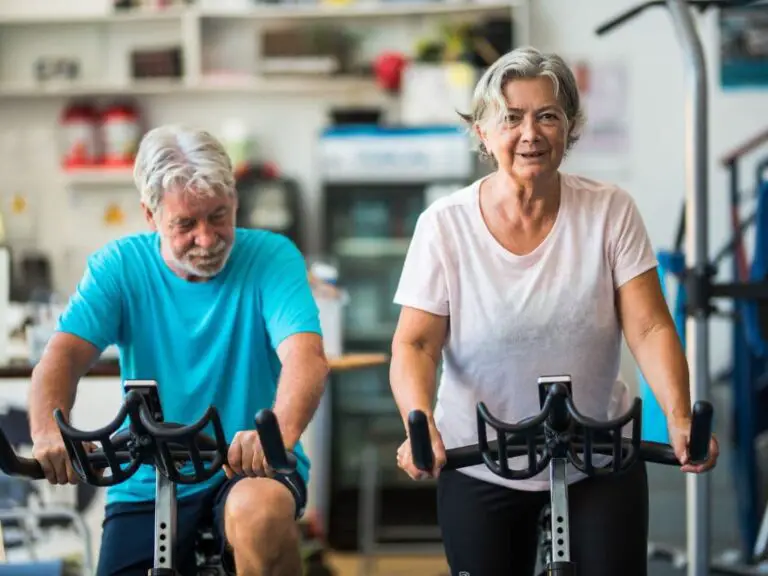The Essential Guide to Senior Nutrition: Key Nutrients for Aging Well
As we age, paying attention to our nutritional needs becomes increasingly important to maintain good health and well-being. A balanced diet with the proper nutrients can help seniors maintain their energy levels, support healthy aging, and prevent the onset of chronic diseases.
In this guide, we will explore the essential nutrients for seniors and discuss their benefits. We will also provide practical tips and recommendations for incorporating these nutrients into a senior’s diet.

What Are the Most Important Nutrients for Seniors?
Nutritional needs change as we age, and certain nutrients become particularly important to ensure optimal health and wellness in seniors. These essential nutrients include protein, calcium, vitamin D, fiber, omega-3 fatty acids, B vitamins (particularly B12 and folate), vitamin C, vitamin A, vitamin E, zinc, and magnesium.
Protein plays a vital role in maintaining muscle mass and strength, supporting immune function, and aiding wound healing. Seniors are recommended to consume between 0.8 and 1.2 grams of protein per kilogram of body weight every day, with sources including meat, poultry, fish, eggs, dairy, beans, and lentils.
Calcium is critical for bone health and the prevention of osteoporosis. The recommended daily intake for seniors is 1200mg, with the best food sources being dairy products, leafy greens, and fortified plant milks.
Vitamin D works in conjunction with calcium to support bone health. A daily intake of 600-800 IU is recommended, with sunlight, fortified foods, and fatty fish as the primary sources.
Dietary fiber is essential for promoting digestive health and preventing constipation, with a daily recommendation of 25-30 grams from fruits, vegetables, whole grains, beans, and nuts.
Omega-3 fatty acids support brain, heart, and eye health, with a recommended daily intake of 250-500mg from sources like fatty fish, walnuts, and flaxseeds.
B vitamins, particularly B12 and folate, are essential for energy, brain function, and red blood cell production. Seniors should aim to consume 2.4μg of B12 and 400μg of folate daily, with the best sources being meat, eggs, legumes, and fortified grains.
Vitamin C, an antioxidant, supports immune health and wound healing. The recommended daily intake is 90mg for men and 75mg for women, with the best sources being citrus fruits, berries, tomatoes, and leafy greens.
Vitamin A is important for vision, immune function, and skin health, with a recommended daily intake of 900mcg RAE for men and 700mcg RAE for women. The best food sources are sweet potatoes, carrots, dark leafy greens, and eggs.
Vitamin E, another antioxidant, may help delay cognitive decline in seniors. A daily intake of 15mg is recommended, with vegetable oils, nuts, seeds, and avocados being the best sources.
Zinc supports immune function, wound healing, and taste, with a recommended daily intake of 11mg for men and 8mg for women. The best food sources are meats, seafood, legumes, and seeds.
Lastly, magnesium aids nerve and muscle function and the regulation of blood pressure. Men are recommended to consume 420mg per day, and women 320mg per day, with the best sources being leafy greens, nuts, seeds, beans, and yogurt.
A balanced diet rich in these nutrients can help seniors maintain their health and well-being as they age. Some seniors may need to consider supplements to meet their nutritional needs. Always consult with a healthcare professional for personalized advice.
| Nutrient | Key Roles | Recommended Intake | Best Food Sources |
|---|---|---|---|
| Protein | Maintains muscle mass/strength, supports immune function, aids wound healing | 0.8-1.2g per kg body weight per day | Meat, poultry, fish, eggs, dairy, beans, lentils |
| Calcium | Critical for bone health and osteoporosis prevention | 1200mg per day | Dairy products, leafy greens, fortified plant milks |
| Vitamin D | Supports bone health, works with calcium | 600-800 IU per day | Sunlight, fortified foods, fatty fish. May need supplements. |
| Fiber | Promotes digestive health, prevents constipation | 25-30g per day | Fruits, vegetables, whole grains, beans, nuts |
| Omega-3s | Support brain, heart, and eye health | 250-500mg EPA/DHA per day | Fatty fish, walnuts, flaxseeds |
| B Vitamins (B12, folate) | Essential for energy, brain function, red blood cell production | B12: 2.4μg per day Folate: 400μg per day | Meat, eggs, legumes, fortified grains |
| Vitamin C | Antioxidant for immune health and wound healing | Men: 90mg per day Women: 75mg per day | Citrus fruits, berries, tomatoes, leafy greens |
| Vitamin A | Important for vision, immune function, skin health | Men: 900mcg RAE per day Women: 700mcg RAE per day | Sweet potatoes, carrots, dark leafy greens, eggs |
| Vitamin E | Antioxidant that may help delay cognitive decline | 15mg per day | Vegetable oils, nuts, seeds, avocados |
| Zinc | Supports immune function, wound healing, taste | Men: 11mg per day Women: 8mg per day | Meats, seafood, legumes, seeds |
| Magnesium | Aids nerve/muscle function, blood pressure regulation | Men: 420mg per day Women: 320mg per day | Leafy greens, nuts, seeds, beans, yogurt |
Protein – The Building Block of Senior Nutrition
Protein is a vital nutrient for seniors, as it plays a crucial role in maintaining muscle mass and strength, supporting immune function, and promoting overall health. However, the protein needs of seniors may differ from those of younger adults. Therefore, it is recommended that seniors consume a higher amount of protein to meet their specific needs.
Best-in-Class Protein Bars for Seniors: A Convenient Protein Source
When it comes to meeting protein requirements, seniors often face challenges due to factors like decreased appetite or difficulty chewing. In such cases, protein bars can be a convenient and accessible option. Best-in-class protein bars for seniors are specially formulated to provide a balanced blend of essential nutrients, including high-quality protein, without compromising taste or texture.
These protein bars are designed with the nutritional needs of seniors in mind, ensuring they contain adequate amounts of protein while being easy to consume. Look for options that include a variety of protein sources, such as whey protein, soy protein, or pea protein, as they provide a complete amino acid profile.
Fiber – Promoting Digestive Health
Fiber is another crucial nutrient that plays a significant role in senior nutrition. It aids in digestion, helps prevent constipation, and supports a healthy gut. Fiber can also help regulate blood sugar levels, lower cholesterol levels, and promote a healthy weight.
Including High-Fiber Foods in a Senior’s Diet
To ensure an adequate intake of fiber, seniors should incorporate high-fiber foods into their diet. These include fruits, vegetables, whole grains, legumes, and nuts. For example, adding fruits like berries or apples to breakfast or snacks, including vegetables in meals, opting for whole grain bread and cereals, and including legumes in soups or salads are some simple ways to increase fiber intake.
Omega-3 Fatty Acids – Nurturing Brain Health
Omega-3 fatty acids are essential fats that are vital to brain health and cognitive function. They have been linked to a reduced risk of cognitive decline and may even help improve memory and mood in seniors.
Sources of Omega-3 Fatty Acids
Fatty fish like salmon, mackerel, and sardines are excellent sources of omega-3 fatty acids. Seniors are encouraged to include these fish in their diet at least twice a week. For those who don’t consume fish, alternatives like flaxseeds, chia seeds, and walnuts can provide plant-based sources of omega-3 fatty acids.
Calcium and Vitamin D – Strengthening Bones
As we age, maintaining bone health becomes increasingly important. Calcium and vitamin D are two key nutrients that work together to support strong bones and prevent conditions like osteoporosis.
Getting Sufficient Calcium and Vitamin D
Dairy products such as milk, yogurt, and cheese are excellent sources of calcium. However, for older adults who are lactose intolerant or prefer non-dairy options, fortified plant-based milk or calcium-rich foods like tofu, almonds, and leafy greens can provide alternative sources of this essential mineral.
Vitamin D is primarily obtained through exposure to sunlight. However, seniors may have limited sun exposure, so consuming vitamin D-rich foods such as fatty fish, egg yolks, or fortified cereals is advisable. In some cases, a vitamin D supplement may be recommended by a healthcare professional.
Antioxidants – Guarding against Cell Damage
Antioxidants help protect the body against cellular damage caused by harmful molecules called free radicals. They have been associated with a reduced risk of chronic diseases and may help slow down the aging process.
Including Antioxidant-Rich Foods
Fruits and vegetables are excellent sources of antioxidants. Brightly colored produce like berries, oranges, spinach, and bell peppers are packed with antioxidants. Seniors should aim to include a variety of colorful fruits and vegetables in their diet to ensure a wide range of antioxidant benefits.
Tips for Getting Enough Nutrients In Your Diet
Getting enough of these key nutrients through your diet is ideal. Here are some tips:
- Eat 3 well-balanced meals and 1-2 healthy snacks per day
- Include a good protein source at each meal – eggs, dairy, beans, fish
- Eat plenty of fruits and vegetables – aim for different colors
- Choose whole grain options – breads, cereals, pastas
- Drink fortified plant milks if you don’t consume dairy
- Try new foods and recipes featuring nutrient-dense ingredients
- Consider a basic multivitamin to help fill any gaps
- Talk to your doctor about any specific nutrient needs or concerns
Potential Signs and Symptoms of Nutrient Deficiencies
Some signs that could indicate a deficiency include:
- Fatigue, weakness
- Bone fractures or breaks
- Frequent illnesses or infections
- Changes in vision
- Poor wound healing
- Digestive issues
- Loss of appetite
- Depression
- Confusion, memory problems
Risks of Excessive Nutrient Intakes
It is possible to consume too much of certain nutrients like vitamins A, D, E, and K, which can lead to adverse effects. Always follow recommended upper intake limits and discuss any high dose supplementation with your doctor.
The key is to aim for balance and moderation to meet your nutrient needs through a varied, colorful diet focused on whole foods. Pay attention to your energy levels, physical abilities, and overall well-being as cues for whether your diet is providing sufficient nutrition as you age. Consult a registered dietitian if needed for tailored guidance. Good nutrition is a fundamental pillar of healthy aging.
Conclusion
Incorporating a wide range of nutrients into a senior’s diet is essential for maintaining good health and promoting healthy aging. Protein, fiber, omega-3 fatty acids, calcium, vitamin D, and antioxidants all play crucial roles in supporting seniors’ overall well-being. Best-in-class protein bars for seniors can be a convenient option to ensure an adequate protein intake, especially for those facing challenges with appetite or chewing.
However, it is essential to remember that a well-rounded diet that includes a variety of whole foods is still the best approach to meet nutritional needs. By focusing on these key nutrients and making smart dietary choices, seniors can age well and enjoy a higher quality of life.







